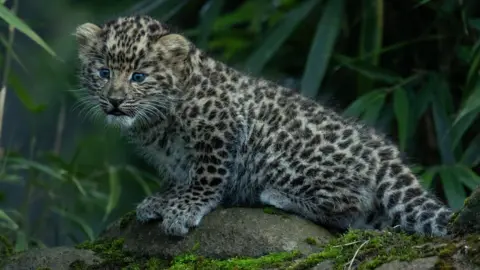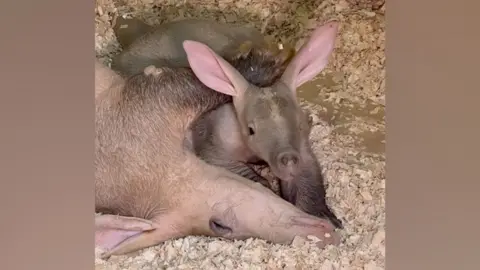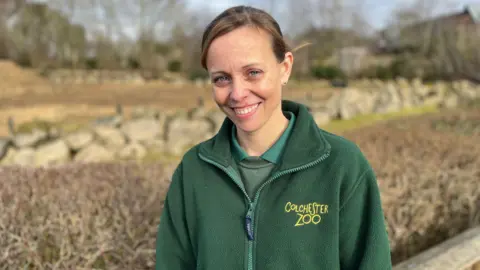Brexit had 'major impact' on breeding says zoo
 Libby Page/Colchester Zoo
Libby Page/Colchester ZooBrexit has had "a major impact" on zoo breeding programmes across Europe, according to an Essex zoo.
More than 60 species at Colchester Zoo have taken part in breeding programmes, but its zoological director, Rebecca Moore, said the number of transfers had dropped since the UK left the European Union (EU), with an increase in paperwork and legislation.
She told the BBC projects with other zoos had become "a lot more difficult…time-consuming [and] expensive".
It came as the government said it was seeking a new veterinary agreement with the EU and was trying to minimise disruption when importing and exporting zoo animals.
'Critically endangered'
Colchester Zoo has welcomed several new arrivals in recent months, including two Amur leopard cubs, of which there are fewer than 100 left in the wild.
"The species itself is critically endangered, so anything that zoos can do to help breed is vital in its importance to its existence," said Emma Rasey, team leader of the zoo's carnivore section.
 Colchester Zoo
Colchester ZooRoo, a baby aardvark, is the 13th offspring of OQ, the most successful breeding aardvark in the UK. Her keeper, Jo Burch, said breeding programmes were vital for education purposes.
"A lot of people would never get the opportunity to see anything apart from their British wildlife, so it is important that we house these animals to educate people," she told the BBC.
Ms Moore said animals at the zoo involved in breeding programmes were coordinated on a European level, but leaving the EU had made this process more complicated.
"Previously we used to move animals relatively easily between the UK and mainland Europe," she said, adding that since Brexit, "the transfers have got less and less in number".
"It really sees an impact on us being able to contribute to those European breeding programmes," she continued.
 Qays Nahim/BBC
Qays Nahim/BBCThe zoological director said changes in paperwork and legislation were needed.
"We hope that the government will look to do an agreement that will make it easier to move animals," Ms Moore said.
"That would then speed up the process and make the whole organisation of it a lot simpler."
A spokesperson for the Department for Environment, Food and Rural Affairs told the BBC: "We continue to work closely with our European counterparts when importing and exporting zoo animals to minimise disruption."
They added: "We are also seeking a new veterinary agreement with the EU to strengthen our trade ties."
'Part of life'
Speaking publicly for the first time about the recent death of one of its zebras, Ms Moore said there were "no plans" to make any changes to the shared enclosure where it happened.
Ziggy the zebra was fatally wounded by a rhino in an accident in January, described by Ms Moore as "a sad, unfortunate incident".
"It was a huge impact for all of the staff," she told the BBC.
"It wasn't the result of a vicious attack or anything like that," she added.
"It is part of life - they have lived together for many years peacefully."
The zoo, which recently started life as a charity after years of private ownership, has more than 1.5 million visitors a year.
Follow Essex news on BBC Sounds, Facebook, Instagram and X.
